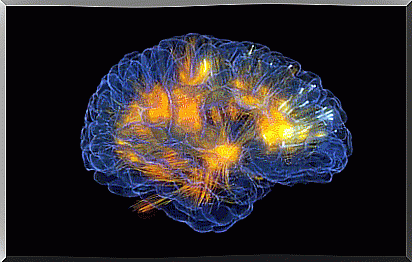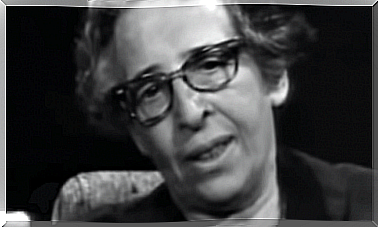Knot In The Stomach? The Black Hole? The Effects Of Anxiety

Sometimes life gets stuck in the deepest center of our body, like a ball that takes all our breath away. There are no butterflies here. But it is that black hole of our fears. It is a trusted enemy that consumes everything. The effects of fear make us feel like life is moving too fast. Our hope fades. These feelings disrupt and distort our priorities.
Experts have invested a lot of time in researching the effects of anxiety on our bodies. Their discoveries are simply astonishing. For example, the psychiatric ward at Johns Hopkins Hospital has found that people with Generalized Anxiety Disorder build up chronic tension in the muscles located in the center of the forehead – in addition, the superficial calf muscles are also overloaded.
But the most common and annoying symptoms occur in the digestive system: in the esophagus, stomach, intestines… Pain in the stomach and in the intestines is very closely linked to anxiety. We must not forget that the digestive system is ‘lined’ with a very complex network of nerve cells. And while this neural network doesn’t send or produce any thoughts, it still affects mood.
For example, it is important to remember that this ‘second’ brain is responsible for controlling serotonin production. Serotonin is also called the happiness hormone. But this system does something else: it reacts violently to stress.
When we go through periods of great pressure, tightness or restlessness, the stomach responds by releasing adrenocorticotropin. This is a peptide hormone that also acts as a neurotransmitter.
At that moment the pain, the hypersensitivity of the autonomic nervous system, the motility of the intestines appear… We feel that annoying knot in the stomach. It’s like all our problems come to life there.

Butterflies and black holes
Martha has two jobs and very little free time. She only sees her six-year-old son when she comes home. He stays up so his mother can say good night to him and tuck him in before he goes to sleep.
Every day she wonders when they can do something together. When will they be able to play together, make a drawing, go for a walk…? During the week, Martha always says. ” Sunday we’ll do anything you want. Wait a little longer.’ But when it is Sunday, Martha is so exhausted that she is unable to get up.
On those Sundays, as she lies in the mess of the sheets, the fatigue and despair, Martha longs for the days when she only felt the feeling of butterflies in her stomach. Everything used to be hopeful.
Now there are only black holes, hidden tears and worries about the bills to be paid. There are not enough hours in a day… Her stomach feels like one big knot that is tightening every day…
The Effects of Anxiety and the Brain
When you look at Martha’s little story from a distance, you might think the solution is simple. She needs to plan better, quit her job or find another job. This gives her the opportunity to spend more and quality time with her child.
But when we suffer from anxiety, our decisiveness does not work in the same way. Because that mechanism in our brains fails completely.

Decision making is a cognitive process that is very finely tuned. It requires weighing risks, accessing rewards and analyzing the relationship between our actions and their consequences. When someone suffers from intense feelings of fear, he loses this ability.
Because we must not forget that feelings of fear have a cognitive and a physical component. The cognitive part reduces to limiting thoughts: ‘ This is all there is, I can’t change anything’, ‘I can do nothing more, all is lost…’.
The physical aspect refers to typical effects of anxiety: dry mouth, trembling, muscle aches, headaches and digestive problems. That’s why it’s really hard to think clearly.
35 ways to deal with anxiety
Dealing with the black hole that arises from feelings of fear is different for everyone. But the approach will always have to focus on different areas, with the behavior as well as the cognitive and physical being all encompassing.
That knot in our stomach steals our health and happiness. But we can fix this. We give you some recommendations here. Put them into practice. All you need is the will to do it and stick with it consistently.

Strategies to Calm Your Anxiety Feelings
- Breathe in and out slowly.
- Talk to yourself out loud and say how you feel: I’m angry because…
- Go for a half hour walk every day.
- Color mandalas.
- Get a massage.
- Take a walk through the forest.
- Ask yourself, “What’s the worst that could happen?” Then answer: ‘What would I do if that happened?’
- Set aside some time to actively search for a solution to a problem. Let your mind come to a solution calmly and without pressure.
- Take a relaxing bath.
- Forgive yourself for not foreseeing a problem that occurred again.
- Clean your room. Throw out the things you don’t use or need.
- Turn off your cell phone and your television. Surround yourself with silence.
- Meet up with someone you feel good with.
- Do the thing you’ve been putting off for so long.
- Go meditate.
- Hug your pet.
- If you’ve made a mistake, design an action plan so it doesn’t happen again in the future.
- Ask yourself whether you might be jumping to conclusions that are too negative.
- Ask yourself if you engage in “disaster thinking.”
- Make a list of the things you like about yourself.
- If someone is confusing you with their behavior, analyze why this is happening and what you can do about it.
- Do yoga.
- Make changes to your daily routine.
- Read before going to sleep. Make this a daily habit.
- Think about how you want to live your life and what you can do to achieve this goal.
- Ask friends how they deal with fear and the consequences of fear.
- Learn to eat slowly and without haste.
- Check if you’re thinking the wrong way. Do you take everything personally? Do you see life mainly in black and white? Do only others experience good things in life?
- Give yourself a gift every day: a walk, a movie, nice music…
- Remember how you handled a difficult period in the past.
- If you envision a negative result, change direction. Try to imagine a positive outcome.
- Write down three things that have worried you in the past that never happened.
- Do some exercises you’ve never tried before: swimming, zumba, archery…
Choose some activities from this list and then perform them. They possess the power to change your life.









